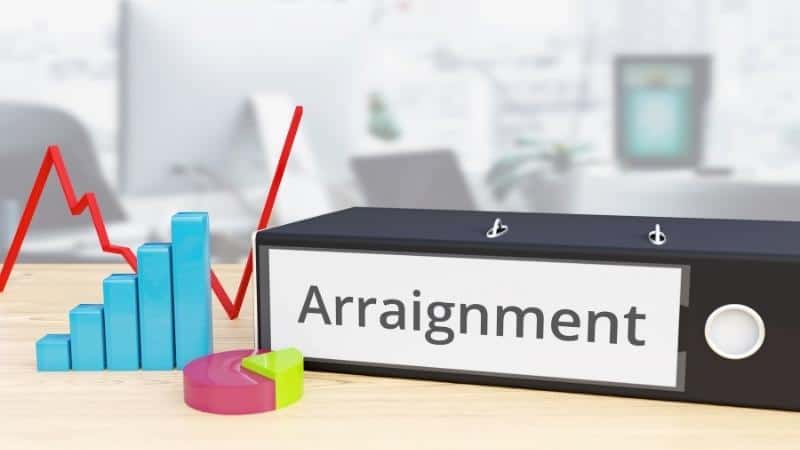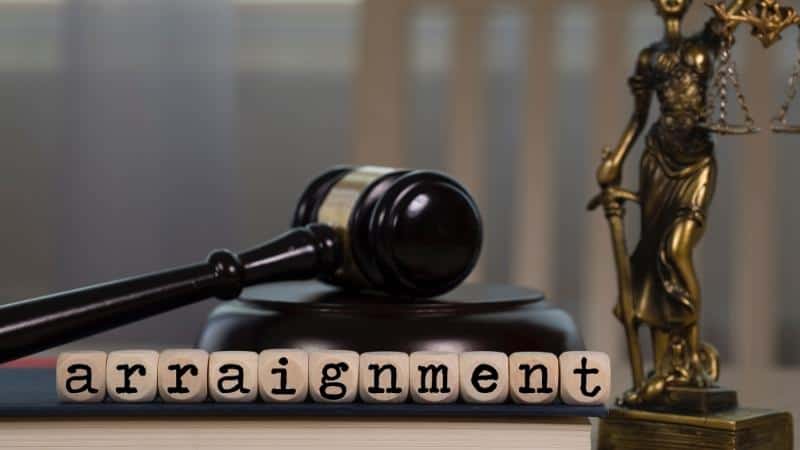A distinct set of stages is followed in criminal proceedings. An indictment, which is a written notification of accusations, is the first step in criminal prosecution. After that, The suspect has been charged and is being held in detention. The arraignment is when the suspect is taken before a court and appraised of the charges.
In most criminal cases, the arraignment is the initial court appearance. The accused are informed of the charges against them along with their constitutional and legal rights at the arraignment session. Following that, they are offered the option of admitting not guilty, guilty, or no contender.
An arraignment is typically the first court proceeding in a criminal case. At the arraignment hearing, defendants are advised of the charges that have been filed as well as their legal and constitutional rights. Afterward, they are given an opportunity to enter a plea of not guilty, guilty, or no contest. An arraignment is basically a court trial where the defendant is: informed of the allegations they are going to face: apprised of their rights, informed of the implications of pleading guilty, and questioned how they intend to plead.
The Federal Laws of Criminal Procedure in the USA mandate that an arraignment should take place in open court, during which the accused is given a copy of the indictment, read the indictment, and asked to plead guilty or not guilty to the charges. A suspect is taken to the court for arraignment after being arrested. A suspect will usually be held in custody for 48 to 72 hours before being arraigned, however, this varies across state and federal courts.
The constitution guarantees defendants the right to be “Aprrise of the nature and grounds of the accusation” which is on the Sixth Amendment of the United States. The defendant, on the other hand, is not obliged to be notified at the time of the arraignment phase.
At arraignments, several states compel judges to inform defendants of their constitutional rights, like the right to a fair trial, the protection from self-incrimination, and the right to counsel. Suspects in some state courts are fully informed as a group prior to appearing in front of the judges.
Detention must be followed by an arraignment within a reasonable amount of time. If there is an unreasonable delay, the suspect’s federal constitutional right to get a retrial is infringed. Any delay must be examined by the judge in order to decide if it was unjustified.
At the arraignment, the defendant in certain states has a legal right to be represented by lawyers. If the prisoner wants a lawyer present, the court cannot arraign him or her without first offering him or her the option to hire a lawyer or appoint a public defender. The charge or charges against you will determine whether or not your lawyer can attend your arraignment on your behalf.
The suspect usually joins the arraignment in person, although in situations where the punishment is a fine or less than a year in jail, the defendant is not required to be present. One or more categories of crime or public defenses can be charged to a person during an arraignment: infractions, misdemeanors, or felonies. All felony and misdemeanor cases—usually, any trial where the offender gets probable imprisonment, whether in prison or jail—require arraignments in several states. Only criminal cases are subject to arraignments in some states.

Charges of a felony
If you are accused of a felony, you must show up in court, even if you have retained a lawyer. So, if you’re accused, the court will order you to appear, and if you have a lawyer, you’ll have to appear with your lawyer.
If your allegation is a felony, however, you must attend all stages of the process alongside your lawyer, including arraignment, pleas, hearing, sections of a trial, and sentence in court.
You must generally attend in person at your arraignment hearing and most other processes if you were charged with a felony offense. There are certain exceptions, such as being able to attend by two-way audio/video conferencing (often known as “video court”) or being exempted from appearing entirely provided you sign a written waiver and the judge approves it.
Your criminal defense lawyer can clarify the various regulations that apply to these exceptions. However, even if you have a valid explanation for skipping an arraignment, the court has the power to compel you to show up in court at any point until your matter is resolved. Failure to appear in a criminal case might result in a new felony prosecution.
Misdemeanor charges
Certain sorts of minor charges enable your lawyer to testify on your behalf without you having to accompany them to court. When the charge is a misdemeanor, the accused is typically permitted to have a lawyer represent you during the arraignment. He or she may protect your rights even if you are not present. If you were charged with a minor offense, you will very certainly be required to attend the arraignment according to the law of California.
In your instance, your defense lawyer will clarify which laws and exceptions are applicable. You will almost certainly be expected to appear in person for your arraignment if you are accused of one of the following misdemeanors:
- Domestic and family violence charges or breaking of an order of protection
- A more serious DUI offense, such as DUI causing harm or vehicular manslaughter while drunk.
Failure to attend for a misdemeanor arraignment is a misdemeanor in and of itself. In misdemeanor arraignments, there are, nevertheless, several exceptions.
Exceptions of misdemeanor
Despite the fact that you are not required to attend court if you are convicted of a misdemeanor, there are circumstances when your presence is mandatory. Take a look at several of them:
- Your lawyer will not be capable of representing you if you are charged with domestic violence. You must present in the arraignment and sentence phases as a criminal. The reasoning for this is that in domestic violence instances, a protection order may be issued by the court. This order should always be physically imposed on the defendant.
- When you are suspected of violating a protection order, you must show up in court (mentioned in the previous point)
- Though your lawyer might testify on your behalf in a DUI case, you must be present for the arraignment, sentence plea, or arraignment. If you’re unsure whether to present or not, go with the alternative “attend” to prevent future issues like a bench warrant or worse.

When your lawyer goes to your arraignment for you but you don’t
If you don’t show up in court, even if your lawyer is there for you, the court can take a variety of steps, including charging you with a crime. Let’s look at some of the actions.
- Bench warrant: If you refuse to show up in court when you are summoned, the judge might bring charges of arresting you. When the warrant is issued, you might be arrested at any time. For example, throughout a regular traffic check, a police officer can check the state’s computer system for information on the warrant and detain you. In a severe criminal case, the court may also order that the warrant be executed at your home or office. You may have to remain in detention until the first trial on your failure appears. There will be a jail term as well as penalties.
- Jail sentence and fines: If you are found to be guilty of failing to appear or criminal contempt, a judge might send you to prison or fine you.
- Suspension of your driver’s license: In certain states, if you refuse to show up in court, the court might compel your driver’s license to be suspended. The suspension will last at a minimum until you stand before a court to clarify why you failed to attend.
- Bond revocation or change in conditions of release: If the court previously released you on your own detainer without asking you to place a bond, the court might change your terms of release by compelling you to deposit money with the court so that you can be freed from jail while your case is ongoing.
Whatever the cause, tell your lawyer what you’ve been charged with, and he or she will tell you whether or not that offense allows you to attend court without having to be present. If you failed to show up for a court hearing or other action as required, you should have to consult with a lawyer as quickly and efficiently as possible. A lawyer is always familiar with the laws in your state or town and can advise you on the best course of action.
Showing up for court in any prosecution stage is always the wisest option. In general, it is to your greatest advantage to show up in court as quickly as possible. This allows you to avoid unfortunate situations and provides you the opportunity to defend yourself in front of an unbiased judge and jury. When circumstances allow, you should even attempt to arrive early. So it’s not suggested to send your lawyer to your arraignment when the court orders you to be present physically.
